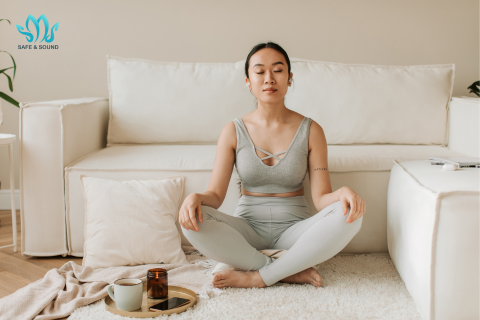Can Meditation Help Overcome Fear and Anxiety? A Guide to Effective Practice | Safe and Sound
Do you often feel anxious, insecure, and scared without knowing the cause? Meditation is recommended by many psychologists as a way to support emotional regulation and restore mental health. The following article will help you understand whether meditation really helps you overcome anxiety and guide you on how to meditate effectively.
Ngo Thi Sang | Master of Educational Psychology – Applied mental health care Safe and Sound
Institute of Medical Technology Applications
1. Anxiety and Fear: Common Psychological Problems Today

Anxiety and fear are common psychological problems today.
In today’s stressful modern life, fear and anxiety have become familiar companions to many people, even though they don’t want them to. Anxiety about the future, career, relationships, or even vague feelings for no reason… makes many people always in a state of stress, fatigue and difficulty finding peace of mind.
According to psychologists, when anxiety persists and exceeds normal tolerance levels, it can become a form of anxiety disorder - directly affecting quality of life, relationships and physical health.
Common symptoms of anxiety disorders include:
- Feeling restless, tense, and constantly afraid
- Difficulty sleeping, digestive disorders, rapid heartbeat
- Difficulty concentrating, easily startled
- Tendency to “overthink” and imagine the worst case scenario
And in the journey to find inner peace, many people have turned to meditation as a natural, simple, and accessible therapy to calm the nervous system and re-establish psychological balance.
2. How does meditation affect the mind?
Meditation is a mind practice originating from Eastern traditions, which has now been scientifically proven to have many clear benefits for mental and emotional health. Psychologists say that meditation helps people bring their attention back to the present, observing their thoughts, emotions, and physical sensations calmly and without judgment.
Many people mistakenly think of meditation as “sitting still and not thinking about anything,” but in reality, meditation is a process of practicing mindfulness and acceptance. You don’t need to try to push away negative thoughts or emotions, but simply recognize their presence and not let yourself be swept away by them. According to psychologists, this is the key point that makes meditation a very effective psychological recovery tool, especially for people who often experience anxiety, fear or anxiety disorders.
Most modern forms of meditation, such as mindfulness meditation, breath meditation, and loving-kindness meditation, are aimed at reducing the mind’s “attachment” to the past (where regrets and obsessions exist) and the future (where fears and anxieties arise). By bringing you back to the present moment where nothing really matters, meditation opens up a more peaceful, comfortable inner space.
See more: 6 common mistakes when first practicing meditation and how to fix them
So how does meditation affect the brain and emotions?
More and more scientific studies have shown that meditation has a direct impact on the structure and function of the brain – the biological basis of human psychology:
- Reduced Amygdala Activity: This is the area responsible for processing fear, anxiety, and stress responses. When the amygdala is overactive, people are prone to falling into a state of “high alert,” overreacting to normal situations. Meditation helps this area “cool down,” thereby reducing chronic anxiety responses.
- Increased gray matter density in the prefrontal cortex, the area of the brain involved in cognition, reasoning, and emotional regulation. Psychologists say that when this area is activated, you will be able to slow down your reaction time before being swept away by negative emotions, a very important skill for people facing anxiety disorders.
- Activating the parasympathetic nervous system helps the body “rest and recover”. As a result, meditation helps lower blood pressure, slows the heart rate, stabilizes breathing, and reduces levels of stress hormones such as cortisol, which are responsible for psychological fatigue, insomnia, and mental exhaustion.
- Increases the connection between the emotional regulation areas and the thinking areas, helping the meditator to identify emotions more clearly, not being "drowned" in emotions but still maintaining a safe enough distance to observe and process.
What does meditation do psychologically and emotionally?
- Helps you recognize emotions without identifying with them: You learn to observe your emotions instead of believing “I am this anxiety.”
- Increased self-acceptance and self-love: Long-term meditators often have higher levels of self-compassion, meaning they are gentle with themselves instead of judging or blaming themselves when they are weak.

Meditation helps increase self-acceptance and self-love
- Creating a sense of inner security: For people who live in fear or have anxiety disorders, the feeling of insecurity is always present. Meditation is a way to rebuild an “inner psychological safe house”, a place you can return to at any time, just by breathing.
- Improve sleep quality, reduce symptoms of anxiety disorders: A study published in the journal JAMA Internal Medicine showed that people who practiced mindfulness meditation for 8 consecutive weeks had significantly reduced levels of anxiety and insomnia compared to the control group.
3. Some notes when starting meditation to support mental health
- Don't expect instant results: Meditation is a journey, not a painkiller. You may not feel better right away, but the benefits will build over time.
- Practice short, regular rather than long, intermittently: Just 5–10 minutes a day, but consistently, will bring about noticeable results.
- Don't force your emotions: If you're panicking, you don't have to meditate right away. It's okay to take a break, go for a walk, and then come back when your mind calms down.
- Combine with psychotherapy when needed: If you are experiencing a serious anxiety disorder (prolonged insomnia, obsession, panic attacks, depression, etc.), meditation is only a complementary tool. You should see a psychologist for proper diagnosis and support.
Safe and Sound Clinic - Family health and psychological support
With a team of experienced doctors and specialists, Safe and Sound Clinic is a pioneer in comprehensive health care with health care services from medicine to psychology.
“Early prevention - Timely support - Long-term companionship”.

If you have any doubts or experience any physical or mental health problems, please contact HOTLINE 0964 778 911 (Phone/Zalo, 24/7) for answers and support as soon as possible!
HOW TO MAKE AN APPOINTMENT for online or in-person consultation with an expert
- At SnS Clinic - IMT Institute
- Or download and schedule a consultation on the Safe and Sound app to manage and track your schedule anytime, anywhere.
Safe and Sound (SnS) - part of the Institute of Applied Medical Technology (IMT)
See also:



